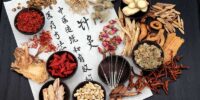Comparing Chinese Medicine And Reiki: Healing Modalities For Energy Balance

Chinese Medicine and Reiki are two distinct healing modalities that aim to restore energy balance within the body. Chinese Medicine is a holistic approach rooted in ancient Chinese philosophy and encompasses various techniques, such as acupuncture and herbal medicine, to restore the flow of Qi (life force energy).
On the other hand, Reiki is a Japanese healing technique that involves the channeling of universal energy through the practitioner’s hands to promote healing and balance. Both modalities have their unique principles and techniques, as well as a range of benefits.
While Chinese Medicine focuses on addressing specific health conditions and promoting overall well-being, Reiki aims to heal the body, mind, and spirit. Choosing between Chinese Medicine and Reiki depends on individual preferences and needs, but combining both modalities can provide a synergistic approach to energy healing.
This article will compare and contrast the principles, techniques, benefits, and considerations of Chinese Medicine and Reiki to help individuals make informed decisions about their healing journey.
Principles of Chinese Medicine
The principles of Chinese Medicine are rooted in the concept of the balance and flow of Qi, a vital energy that circulates throughout the body, influencing overall health and well-being.
According to Chinese Medicine, the body is seen as a holistic system, where each part is interconnected and constantly interacting with the others.
In order to maintain health, it is necessary to ensure that the Qi flows freely and is in balance. This can be achieved through various methods such as acupuncture, herbal medicine, and dietary therapy.
Acupuncture involves the insertion of thin needles into specific points on the body to stimulate the flow of Qi. Herbal medicine utilizes natural substances to restore balance and promote health. Dietary therapy focuses on consuming foods that are appropriate for an individual’s constitution and specific health needs.
By addressing imbalances in Qi, Chinese Medicine aims to restore harmony and promote overall well-being.
Principles of Reiki
Principles of Reiki encompass a set of guiding principles that emphasize the importance of healing and balancing one’s energy. These principles serve as a foundation for practitioners to promote holistic well-being. Reiki practitioners believe in the existence of a life force energy that flows through all living beings and is essential for maintaining physical, emotional, and spiritual health. By channeling this energy, practitioners aim to remove energy blockages and restore balance in the body.
The principles of Reiki encourage practitioners to let go of anger, worry, and fear, and instead cultivate gratitude, compassion, and integrity. They also emphasize the importance of living in the present moment and being mindful of one’s thoughts and actions.
Through these principles, Reiki aims to promote inner peace, relaxation, and overall vitality.
- Sub-list 1:
- Letting go of negative emotions
- Cultivating positive qualities
- Sub-list 2:
- Living in the present moment
- Practicing mindfulness in thoughts and actions
Techniques Used in Chinese Medicine
Techniques utilized in the practice of Chinese medicine involve a variety of methods aimed at promoting well-being and restoring harmony within the body.
One commonly used technique is acupuncture, which involves the insertion of thin needles into specific points on the body to stimulate the flow of energy, or qi. This is believed to rebalance the body’s energy and promote healing.
Another technique is herbal medicine, which uses a combination of plants and minerals to treat various ailments. Chinese herbal medicine is based on the concept of yin and yang, and aims to restore balance between these two opposing forces.
Other techniques used in Chinese medicine include cupping, moxibustion, and tuina massage. Cupping involves the use of suction cups to improve blood circulation and alleviate pain, while moxibustion uses heat to stimulate acupuncture points.
Tuina massage involves the manipulation of the body’s energy channels to promote healing and relaxation.
Overall, these techniques are used in Chinese medicine to restore the body’s energy balance and promote optimal well-being.
Techniques Used in Reiki
An alternative approach to promoting well-being and restoring harmony within the body involves the utilization of various techniques in the practice of Reiki. Reiki, a Japanese healing modality, focuses on balancing the body’s energy flow to enhance physical and emotional healing. The techniques used in Reiki aim to channel universal life force energy through the practitioner’s hands to the recipient.
These techniques include:
- Hands-on healing: The practitioner places their hands on or slightly above the recipient’s body to transfer healing energy.
- Scanning: The practitioner moves their hands over the recipient’s body to detect energy imbalances or blockages.
- Chakra balancing: Reiki practitioners work on the body’s energy centers, known as chakras, to restore their balance and vitality.
- Intention setting: Practitioners use focused intention and visualization techniques to direct healing energy to specific areas of the body.
Through these techniques, Reiki aims to promote relaxation, reduce stress, and support the body’s natural healing processes.
Benefits of Chinese Medicine
Chinese medicine offers a range of therapeutic approaches that aim to restore harmony and promote well-being within the body. This ancient practice believes that the body is interconnected, and imbalances in one area can affect the overall health of an individual. Chinese medicine encompasses various techniques such as acupuncture, herbal medicine, and dietary therapy. Acupuncture involves the insertion of thin needles into specific points on the body to stimulate the flow of energy. Herbal medicine utilizes natural substances to rebalance the body’s energy. Dietary therapy focuses on the consumption of specific foods to support the body’s healing process. These techniques have been found to have numerous benefits, including pain relief, stress reduction, improved digestion, and enhanced immune function. Chinese medicine offers a holistic approach to healing, addressing not only the symptoms but also the underlying causes of illness.
| Benefits of Chinese Medicine |
|---|
| Pain relief |
| Stress reduction |
| Improved digestion |
| Enhanced immune function |
| Holistic approach to healing |
Benefits of Reiki
Reiki, a healing modality that originated in Japan, offers a range of benefits.
Firstly, it is known for its ability to reduce stress and promote relaxation. Many individuals find that receiving Reiki helps them to release tension and experience a deep sense of calm.
Additionally, Reiki has been found to be effective in promoting emotional healing, as it can help individuals process and release unresolved emotions.
Lastly, Reiki is believed to facilitate spiritual growth by helping individuals connect with their inner selves and higher power, leading to a greater sense of purpose and meaning in life.
Stress Reduction and Relaxation
Stress reduction and relaxation can be achieved through the utilization of different healing modalities. Both Chinese medicine and Reiki offer techniques that promote relaxation and help alleviate stress. Chinese medicine employs various methods, such as acupuncture and herbal remedies, to restore balance in the body and mind. Reiki, on the other hand, involves the transfer of healing energy through the practitioner’s hands to the recipient, aiming to promote relaxation and reduce stress.
To further illustrate the techniques used in both modalities, a comparison table is provided below:
| Technique | Chinese Medicine | Reiki |
|---|---|---|
| Acupuncture | Involves inserting needles at specific points on the body to stimulate energy flow and restore balance. | Not applicable. |
| Herbal remedies | Utilizes various herbs to address imbalances and promote overall well-being. | Not applicable. |
| Energy transfer | Not applicable. | Involves the transfer of healing energy through the practitioner’s hands to the recipient. |
By incorporating these techniques, Chinese medicine and Reiki offer individuals effective approaches to reduce stress and achieve a state of relaxation.
Emotional Healing
Emotional healing techniques in alternative therapies offer individuals a pathway to cultivate inner peace and restore psychological well-being. Both Chinese medicine and Reiki provide methods for addressing emotional imbalances by promoting the flow of energy and releasing blockages.
Chinese medicine views emotions as an integral part of overall health and focuses on restoring balance to the body’s energy systems. Techniques such as acupuncture and herbal remedies are used to regulate emotions and promote emotional well-being.
Reiki, on the other hand, involves the channeling of universal life force energy to balance the body’s energy centers or chakras. By restoring energy flow and removing emotional blockages, Reiki aims to promote emotional healing and enhance overall well-being.
Both modalities offer individuals a holistic approach to emotional healing, allowing them to address the root causes of emotional imbalances and restore harmony within themselves.
Spiritual Growth
One aspect of alternative therapies that can be explored for personal growth is the development and cultivation of spirituality. This aspect is particularly emphasized in both Chinese medicine and Reiki, as they aim to restore balance and harmony on a spiritual level.
By engaging in these healing modalities, individuals can embark on a journey of spiritual growth, which may involve the following:
- Connecting with one’s inner self and gaining a deeper understanding of one’s purpose in life.
- Expanding consciousness and developing a sense of interconnectedness with the universe.
- Cultivating mindfulness and being present in the moment.
- Strengthening one’s connection with higher powers or spiritual entities.
These practices can provide individuals with a sense of serenity, clarity, and purpose, allowing them to enhance their spiritual well-being and ultimately achieve personal growth.
Choosing Between Chinese Medicine and Reiki
This discussion will focus on the key points to consider when choosing between Chinese Medicine and Reiki, including personal preferences and beliefs, availability and accessibility, and integration with other modalities.
Personal preferences and beliefs play a crucial role in deciding which healing modality to pursue, as individuals may have different inclinations towards certain practices based on their cultural background or personal experiences.
Moreover, the availability and accessibility of Chinese Medicine and Reiki practitioners should also be taken into account, as it may vary depending on one’s location and resources.
Finally, the integration of these modalities with other healing practices should be considered, as some individuals may prefer a more holistic approach that combines multiple modalities for optimal results.
Personal Preferences and Beliefs
Beliefs and personal preferences play a significant role in shaping individuals’ preferences for different healing modalities, such as Chinese medicine and reiki, as they seek to achieve energy balance.
Some individuals may have a strong belief in the principles of Chinese medicine, which emphasizes the balance of Yin and Yang energies and follows a holistic approach to health. They may prefer the use of acupuncture, herbal remedies, and dietary adjustments to restore energy balance.
On the other hand, individuals with a preference for reiki may resonate with the idea of channeling universal life force energy to promote healing. They may find comfort in the gentle touch and energy transfer involved in reiki sessions.
Personal experiences, cultural background, and spiritual beliefs can also influence individuals’ preferences for these healing modalities.
It is important to respect and acknowledge these personal preferences when considering different options for energy balance.
Availability and Accessibility
The availability and accessibility of different healing practices can vary depending on factors such as geographic location, healthcare systems, and cultural acceptance. In terms of availability, Chinese medicine and Reiki may differ based on their respective origins and popularity in different regions.
For example, Chinese medicine may be more readily available in areas with a larger Chinese population or where it is integrated into the mainstream healthcare system. Reiki, on the other hand, may have a more niche following and may be less accessible in certain regions.
Additionally, accessibility can also be influenced by cultural acceptance. In some cultures, Chinese medicine may be more widely accepted and easily accessible, while Reiki may be viewed with skepticism or be less recognized.
Overall, the availability and accessibility of these healing modalities can vary greatly based on various factors, making it important for individuals to consider their specific circumstances when seeking out these practices.
- Factors affecting availability:
- Geographic location
- Healthcare systems
- Factors affecting accessibility:
- Cultural acceptance
- Popularity and recognition
Integration with Other Modalities
Integration with other healing practices can enhance the effectiveness and scope of Chinese medicine and Reiki, allowing for a more comprehensive approach to promoting well-being and healing. When these modalities are combined with other modalities such as acupuncture or massage therapy, they can work synergistically to address a wider range of health issues.
For example, Chinese medicine and Reiki can be integrated with acupuncture to provide a more holistic treatment plan for patients. Acupuncture can help balance the flow of energy in the body, while Chinese medicine and Reiki can further support and enhance this process.
Similarly, combining Reiki with massage therapy can provide a deeper level of relaxation and stress reduction, as well as promote the flow of energy throughout the body.
By integrating these modalities, practitioners can offer a more personalized and effective approach to healing and energy balance.
Combining Chinese Medicine and Reiki
By incorporating both Chinese Medicine and Reiki practices, individuals can enhance their overall well-being by harmonizing and balancing their energy systems.
Chinese Medicine, with its focus on the flow of Qi and the balance of Yin and Yang, provides a framework for understanding and diagnosing imbalances in the body.
Reiki, on the other hand, works by channeling universal life force energy to promote healing and relaxation.
When these two modalities are combined, they can complement each other and offer a more holistic approach to healing.
Combining Chinese Medicine and Reiki can provide the following benefits:
- Enhanced energy flow: By addressing blockages and imbalances in the body’s energy systems through Chinese Medicine techniques and then channeling Reiki energy, individuals can experience improved energy flow and vitality.
- Deep relaxation: Chinese Medicine and Reiki both promote relaxation and stress reduction. When used together, they can help individuals achieve a deeper state of relaxation, which is essential for healing and overall well-being.
- Accelerated healing: By addressing both the physical and energetic aspects of health, the combination of Chinese Medicine and Reiki can facilitate and accelerate the body’s natural healing processes.
Combining Chinese Medicine and Reiki offers a comprehensive approach to energy balance and healing, allowing individuals to achieve optimal well-being.
Frequently Asked Questions
Are there any potential side effects or risks associated with Chinese Medicine or Reiki?
Potential side effects and risks associated with Chinese medicine may include allergic reactions, adverse drug interactions, and incorrect diagnosis. Reiki, on the other hand, is generally considered safe but may cause temporary discomfort or emotional release during sessions.
How long does it typically take to see results from Chinese Medicine compared to Reiki?
The time it takes to see results from Chinese medicine and Reiki can vary depending on the individual and the specific condition being treated. It is important to consult with a trained practitioner for an accurate assessment.
Can Chinese Medicine or Reiki be used as a standalone treatment or should they be used in conjunction with other therapies?
Chinese medicine and Reiki can be used as standalone treatments for energy balance. However, they can also be used in conjunction with other therapies to enhance their effectiveness and provide a more comprehensive approach to healing.
Are there any specific conditions or ailments that Chinese Medicine or Reiki are particularly effective in treating?
Chinese medicine and reiki have been found to be effective in treating a variety of conditions and ailments. Chinese medicine is commonly used for pain management, digestive issues, and respiratory problems, while reiki is often used for stress reduction, anxiety, and promoting relaxation.
Are there any specific qualifications or certifications that practitioners of Chinese Medicine or Reiki should have?
Specific qualifications and certifications for practitioners of Chinese medicine include a degree in Traditional Chinese Medicine (TCM) and a license to practice. For Reiki, practitioners can obtain certification through various Reiki organizations and training programs.







